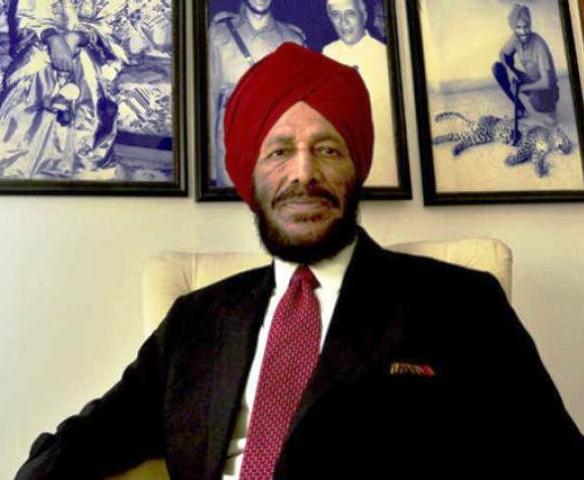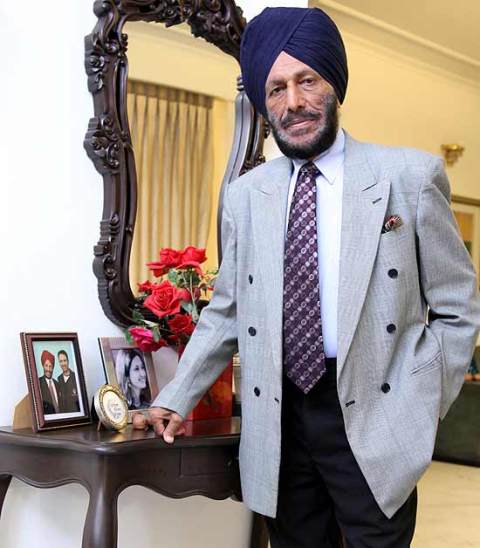Milkha Singh Age, Death, Wife, Children, Family, Biography & More
Quick Info→
Death Date: 18/06/2021
Wife: Nirmal Saini (late)
Age: 91 Years

| Bio | |
|---|---|
| Real Name | Milkha Singh |
| Nickname | The Flying Sikh |
| Profession | Athlete |
| Physical Stats & More | |
| Height (approx.) | in centimeters– 178 cm in meters– 1.78 m in feet inches– 5’ 10” |
| Weight (approx.) | in kilograms– 70 kg in pounds– 154 lbs |
| Eye Colour | Dark Brown |
| Hair Colour | Salt & Pepper |
| Track and Field | |
| International Debut | In the 1956 Melbourne Olympic Games. |
| Coach/Mentor | Gurdev Singh, Charles Jenkins, Dr. Arthur W Howard
 |
| Records/Awards/Honours | • Won a Gold at the 1958 Asian Games – 200 m. • Won a Gold at the 1958 Asian Games – 400 m. • Won a Gold at the 1958 Commonwealth Games – 440 yards. • Honoured with Padma Shri in 1959. • Won a Gold at the 1962 Asian Games – 400 m. • Won a Gold at the 1962 Asian Games – 4 x 400 m relay. • Won a Silver at the 1964 Calcutta National Games – 400 m. |
| Personal Life | |
| Date of Birth | • 20 November 1929 (according to records in Pakistan) • 17 October 1935 and 20 November 1935 (other official records of various States) |
| Birthplace | Govindpuri, Muzaffargarh city, Punjab Province, British India (now Muzaffargarh District, Pakistan) |
| Date of Death | 18 June 2021 |
| Place of Death | PGIMER, Chandigarh |
| Age (at the time of death) | 91 Years |
| Death Cause | COVID-19 [1] |
| Hometown | Chandigarh, India |
| Zodiac sign/(as per 20 November 1929) | Scorpio |
| Nationality | Indian |
| School | A village School in Pakistan |
| College | Did not attend |
| Educational Qualification | Studied at a village school in Pakistan up to 5th standard |
| Family | Father– Name Not Known Mother– Name Not Known Siblings– Ishar (sister), Makhan Singh (eldest brother) & 12 More |
| Religion | Sikhism |
| Address | #725, Sector 8 B, Chandigarh |
| Hobbies | Playing Golf, Walking, Doing Work-outs |
| Controversies | • In 1998, when Paramjeet Singh broke Milkha Singh’s 38-year-old 400 m record, Milkha disowned his record and said, “I do not recognise this record.” Milkha’s primary objection was Paramjeet’s timing of 45.70. At the Rome Olympics, Milkha was officially hand-timed at 45.6 though an unofficial electronic timer at the games clocked him at 45.73. Years later electronic timers were installed at all international events. It was accepted that 0.14 seconds would be added to all hand timings to compare them with electronic timings. So, Milkha’s hand-timed 45.6 was converted into an electronic time of 45.74. Either way, Paramjeet’s timing was better, but Milkha was unmoved and said: “My record of 45.6 still stands. If a timing is registered it is there. You cannot change it after some years.” • In 2016, he had some heated exchange of words with Salim Khan (father of Salman Khan). The story behind the row was the appointment of Salman Khan as the goodwill ambassador of the Indian contingent for the Rio Olympic Games. The sports fraternity including Milkha Singh and wrestler Yogeshwar Dutt had questioned the appointment. In a bid to defend Salman, Salim Salim tweeted: “Milkhaji it is not Bollywood it is the Indian Film Industry and that too the largest in the world. The same industry which resurrected you from fading away in oblivion.” In reply to this, Milkha said, “It’s okay they have made a film on me. I don’t think that the movie industry has made a favour to me by making a film on my life. “If they have any function, will they put any sportsmen as their chairman or ambassador?” He further said: “It doesn’t make sense to appoint someone in this role. If an ambassador is required, we have many great sportspersons, like Sachin Tendulkar, P.T. Usha, Ajitpal Singh, Rajyavardhan Singh Rathore.” |
| Girls, Affairs and More | |
| Marital Status (at the time of death) | Widower |
| Affairs/Girlfriends | Betty Cuthbert (An Australian Athlete)
 |
| Wife/Spouse | Nirmal Kaur (former captain of Indian Women Volleyball team); she died of COVID-19 on 13 June 2021.
 |
| Marriage Date | Year 1962 |
| Children | Son– Jeev Milka Singh (Golfer) Daughters– Sonia Sanwalka & 2 More  |
| Money Factor | |
| Net Worth (aprox.) | $2.5 million (as of 2012) |

Some Lesser Known Facts About Milkha Singh
- Did Milkha Singh drink alcohol?: Yes
- There is no concrete evidence regarding his date of birth. However, according to some official reports, he was born in a Sikh Rathore Rajput Family in Govindpura Village of Muzaffargarh City in British India.
- Milkha Singh had no idea when he was born. However, he mentioned in his autobiography titled “Flying Sikh Milkha Singh” that he must have been around 14-15 years old at the time of India’s Partition.
- During the communal riots following India’s Partition, Milkha lost his parents when he was around 12-15 years old.
- Three days before the carnage that devastated Milkha’s life, he was sent to Multan to take the help of his eldest brother, Makhan Singh, who was then serving in the army. On the train to Multan, he sneaked into the ladies compartment to hide himself under a seat as he feared being killed by murderous mobs.
- By the time Milkha returned along with his brother Makhan, rioters had turned their village into a cremation ground. Many dead bodies including Milkha’s parents’, 2 brothers’ and their wives’ could not even be recognised.
- After around 4 or 5 days of the incident, Makhan boarded his wife Jeet Kaur and brother Milkha in an army truck headed for India. They were dropped at the Ferozepur-Hussaniwala area.
- In search of work, he often visited the local army camps and at times, he would often polish shoes to get food.
- A lack of job opportunity and floods forced Milkha and his sister-in-law to shift to Delhi. They travelled to Delhi sitting on the roof of a train.
- As there was no place to stay in Delhi, they spent a few days at the Railway platforms. Later, they discovered that his sister-in-law’s parents had settled in a locality called Shahdara in Delhi.
- Milkha felt suffocated at his sister-in-law’s house as it was proving to be burdensome for him. However, a slice of relief for Milkha came when he discovered that one of his sisters, Iswar Kaur, was living in a locality nearby.
- As there was nothing to do for Milkha, he started spending his time on the streets and in the process, he fell in bad company. He started watching movies, and to buy tickets, he started gambling and stealing along with other boys.
- Soon, his eldest brother Makhan Singh got his posting in India at the Red Fort. Makhan took Milkha to a nearby school and got admitted him in 7th standard. However, Milkha could not cope with his studies, and again, he fell into bad company.
- In 1949, Milkha and his friends thought of joining the Indian Army and went for recruitment to the Red Fort. However, Milkha was rejected. He again gave a try in 1950 and was again rejected. After being rejected twice, he started working as a mechanic. Later, he got a job in a rubber factory where his salary was 15 INR/month. However, he couldn’t work for long as he suffered a heat stroke and remained bed-ridden for 2 months.
- In the November of 1952, he got a job in the Army with the help of his brother and was posted to Srinagar.
- From Srinagar, he was sent to EME (Electrical Mechanical Engineering) unit of the Indian Army at Secunderabad.
- In January 1953, he finished 6th in a six-mile (approximately 10 km) cross-country race.

- Milkha ran his first-ever-400m race in 63 seconds at a Brigade Meet and finished 4th. When Milkha was asked if he would be able to run the 400m race, his first reaction was – “How long is 400m?” He was then informed by a former athlete, Gurdev Singh, that 400m accounted for one round of the track.
- Milkha started practicing 400m race on his own, and in the process, sometimes, blood would ooze out of his nostrils.
- Milkha was selected to participate in the 1956 Melbourne Olympics. However, he lost in the initial rounds.

- Milkha created history when he bagged India’s first gold at the Commonwealth Games in 1958 at Cardiff. He gives credit of this victory to his American Coach, Late Dr. Arthur W Howard.
- After his success in the 958 Asian Games, he was promoted to Junior Commissioned Officer from the rank of Sepoy.
- In 1958, he was honored with the Padma Shri.

- In March 1960, Pakistan invited Indian Athletics Team for a dual championship in Lahore. Initially, Milkha was resistant to visit Pakistan due to his horrific experience during the partition. However, when Jawaharlal Nehru (the then Prime Minister of India) insisted Milkha to participate in the championship for the pride of India, he agreed to compete in Pakistan. There he defeated Pakistan’s champion athlete Abdul Khalik in the 200m race and earned the sobriquet of “Flying Sikh” given by Ayub Khan (the then President of Pakistan).

- He finished 4th at the 1960 Rome Olympics; the defeat still haunts his memory lane as he lost the Bronze by just 0.1 sec. In his book, Milkha explains, “I was the fastest until 250m, and then God knows what happened and I slowed down my pace a bit. When we reached the 300m mark, there were three athletes ahead of me. Later, all I could do was finish third in a tie. It was a photo finish [where the winner is declared after watching a re-run because the competition is close]. When the final announcement was made, I had lost everything.”
- Because of his long hair and beard, Milkha became extremely popular during the 1960 Rome Olympics. After seeing his headgear, Romans thought he was a saint and were amazed how a saint managed to run so fast.
- In 1960, Partap Singh Kairon (the then Chief Minister of Punjab), persuaded him to leave the army and join the Department of Sports, Punjab, as Deputy Director.
- In the 1960s, Milkha met his future wife, Nirmal Kaur (an International Volleyball Player), in Patiala.
- He also participated at the 1964 Summer Olympics in Tokyo.
- In 2001, Milkha turned down an offer of the Arjuna Award. He rejected the offer saying: “I rejected the Arjuna I was offered after I received the Padma Shree. It was like being offered an SSC certificate after securing a masters degree.”
- In 2008, Rohit Brijnath (a Journalist), described Milkha as “the finest athlete India has ever produced.”
- All of his medals were donated to the country. Initially, they were displayed at the Jawaharlal Nehru Stadium in New Delhi and later moved to a Museum in Patiala.
- In 2012, he donated his Adidas shoes that he had worn during the 400m final race at the 1960 Rome Olympics to a charity auction organised by actor Rahul Bose.

- In 2013, Milkha and his daughter Sonia Sanwalka co-wrote his autobiography titled “The Race of My Life.”

- Milkha Singh sold the rights of his biography to Rakesh Omprakash Mehra who produced and directed the 2013 Biographical film “Bhaag Milkha Bhaag” featuring Farhan Akhtar and Sonam Kapoor in the lead roles.













